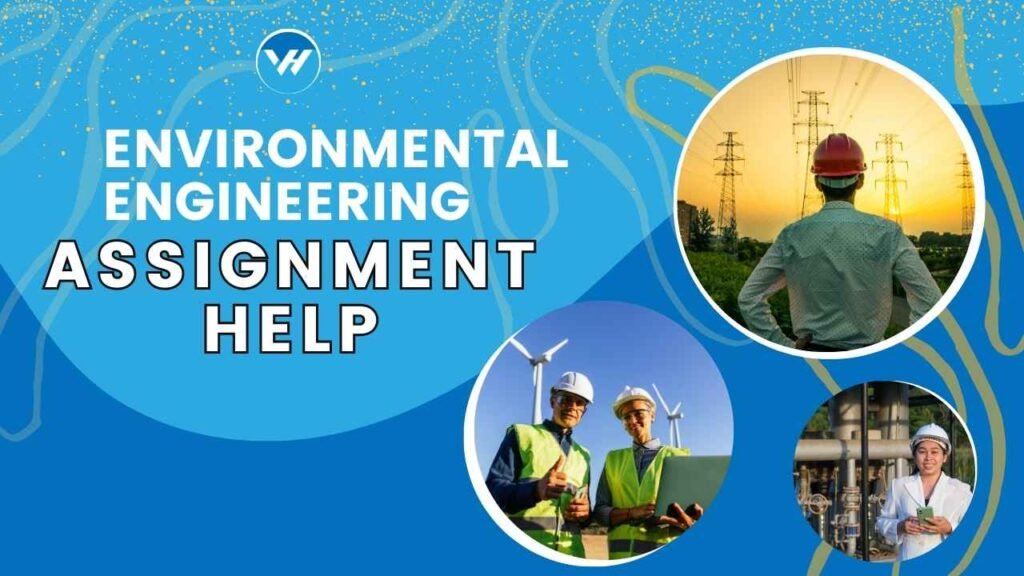Environmental engineering is a field that plays a crucial role in ensuring the sustainability and health of our planet. It involves the application of scientific and engineering principles to improve and protect the environment. Given the complexity and importance of this discipline, many students find themselves seeking help with their environmental engineering assignments. This guide aims to provide a comprehensive look at the various aspects of environmental engineering, the challenges students face, and how to overcome them with the right assignment help.

Table of Contents
ToggleUnderstanding Environmental Engineering
Environmental engineering encompasses a wide range of topics and areas of study. It focuses on designing systems and solutions to address environmental issues such as pollution, waste management, and sustainable development.
Core Concepts
At its core, environmental engineering deals with concepts such as environmental chemistry, hydrology, and microbiology. Understanding these concepts is essential for tackling real-world environmental problems.
Key Areas of Study
Key areas include water and wastewater treatment, air quality management, soil remediation, and renewable energy systems. Each of these areas requires a deep understanding of both scientific principles and engineering practices.
Real-World Applications
Environmental engineers work on projects ranging from designing water treatment plants to developing policies for air quality management. Their work is essential for creating a sustainable and healthy environment.
Common Challenges in Environmental Engineering Assignments
Environmental engineering assignments can be challenging due to the complexity of the subject matter and the interdisciplinary nature of the field.
Complex Theories and Concepts
Students often struggle with understanding and applying complex theories related to environmental processes and systems.
Interdisciplinary Nature
The field requires knowledge of various disciplines such as biology, chemistry, physics, and mathematics, making it challenging to integrate all these areas effectively.
Data Analysis and Interpretation
Assignments often involve analyzing large datasets and interpreting the results to draw meaningful conclusions. This requires strong analytical skills and proficiency in using statistical tools.
Technical Writing Skills
Writing clear and concise technical reports is another common challenge. Students must be able to communicate their findings effectively, which requires good writing skills and attention to detail.
Benefits of Seeking Assignment Help
Getting help with environmental engineering assignments can provide numerous benefits.
Expert Guidance
Professional tutors can offer expert guidance on complex topics, helping students understand difficult concepts and improve their problem-solving skills.
Time Management
With assignment help, students can manage their time more effectively, balancing their studies with other responsibilities.
Quality Assurance
Assignment help services ensure that the work is of high quality, free from errors, and meets academic standards.
Stress Reduction
By alleviating the pressure of deadlines and difficult assignments, students can reduce their stress levels and focus on learning.
Types of Environmental Engineering Assignments
Environmental engineering students may encounter various types of assignments, each with its own set of requirements and challenges.
Research Papers
These require in-depth research on a specific topic, critical analysis, and the ability to present findings clearly and logically.
Lab Reports
Lab reports document experiments and their outcomes, necessitating accuracy in data collection and interpretation.
Project Work
Projects often involve designing and implementing solutions to environmental problems, requiring creativity and technical skills.
Essays
Essays require a comprehensive understanding of the topic and the ability to present arguments and evidence coherently.
How to Choose the Right Assignment Help Service
Choosing the right assignment help service is crucial for achieving academic success.
Credibility and Reputation
Look for services with a good reputation and positive reviews from other students.
Expertise of Tutors
Ensure that the tutors have relevant qualifications and experience in environmental engineering.
Customization and Flexibility
Choose a service that offers customized solutions tailored to your specific needs and preferences.
Pricing and Affordability
Compare prices and choose a service that offers good value for money without compromising on quality.
Features of a Good Assignment Help Service
A good assignment help service should offer several key features.
Plagiarism-Free Content
Ensure that the service provides original content that is free from plagiarism.
Timely Delivery
Timely delivery is essential to meet assignment deadlines and avoid penalties.
24/7 Support
Round-the-clock support ensures that you can get help whenever you need it.
Confidentiality
The service should maintain the confidentiality of your personal information and assignment details.
Tips for Writing a Stellar Environmental Engineering Assignment
Writing a stellar assignment requires careful planning and execution.
Understanding the Assignment Requirements
Make sure you fully understand the assignment requirements and guidelines before starting.
Conducting Thorough Research
Conduct thorough research using credible sources to gather relevant information.
Structuring Your Assignment
Organize your assignment logically, with clear headings and subheadings.
Citing Sources Properly
Properly cite all sources to avoid plagiarism and give credit to the original authors.
Proofreading and Editing
Proofread and edit your work to eliminate errors and improve clarity and coherence.
Technological Tools for Environmental Engineering
Various technological tools can aid environmental engineering students in their studies.
Software and Applications
Software like AutoCAD, MATLAB, and GIS can help in designing and analyzing environmental systems.
Online Resources
Online resources such as academic journals, e-books, and databases provide valuable information for research and assignments.
Data Analysis Tools
Tools like Excel and SPSS can assist in analyzing and interpreting data effectively.
Future Trends in Environmental Engineering
Environmental engineering is an ever-evolving field with several emerging trends.
Sustainable Development
There is a growing focus on sustainable development and creating solutions that are environmentally friendly and economically viable.
Climate Change Mitigation
Environmental engineers are working on innovative ways to mitigate the impacts of climate change.
Innovations in Waste Management
New technologies and approaches are being developed to manage waste more efficiently and reduce environmental impact.
The Role of Environmental Engineers in Society
Environmental engineers play a vital role in society by protecting natural resources, improving public health, and developing sustainable solutions.
Protecting Natural Resources
They work on projects to conserve and protect natural resources such as water, air, and soil.
Improving Public Health
By addressing environmental issues, they help improve public health and reduce the risk of diseases.
Developing Sustainable Solutions
They develop sustainable solutions to environmental problems, ensuring a better future for generations to come.
Balancing Academic and Practical Knowledge
Balancing academic knowledge with practical experience is crucial for success in environmental engineering.
Internships and Fieldwork
Internships and fieldwork provide hands-on experience and practical skills.
Industry Collaboration
Collaborating with industry professionals can provide valuable insights and enhance learning.
Continuous Learning
Environmental engineers must stay updated with the latest developments and continue learning throughout their careers.
Conclusion
In conclusion, environmental engineering is a challenging but rewarding field that requires a strong understanding of various scientific and engineering principles. Seeking assignment help can provide numerous benefits, including expert guidance, time management, and stress reduction. By choosing the right service and following the tips provided, students can excel in their environmental engineering assignments and achieve academic success.
FAQs
What is the importance of Environmental Engineering?
Environmental engineering is crucial for developing sustainable solutions to environmental problems, protecting natural resources, and improving public health.
How can I improve my grades in Environmental Engineering assignments?
Seek help from professional tutors, conduct thorough research, understand the assignment requirements, and proofread your work.
What tools are essential for Environmental Engineering students?
Essential tools include software like AutoCAD and MATLAB, online resources, and data analysis tools like Excel and SPSS.
How do I choose a reliable assignment help service?
Look for services with a good reputation, qualified tutors, customization options, and affordable pricing.
What are the future career prospects in Environmental Engineering?
Future career prospects include roles in sustainable development, climate change mitigation, and waste management, with opportunities in both the public and private sectors.





